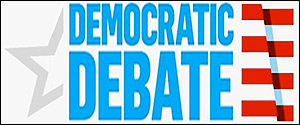By Jim Ellis
 Oct. 1, 2019 — The Democratic National Committee had barely announced the new qualification requirements for the November and December presidential debates when three candidates immediately proved they met the polling requirement and several others reached the halfway point.
Oct. 1, 2019 — The Democratic National Committee had barely announced the new qualification requirements for the November and December presidential debates when three candidates immediately proved they met the polling requirement and several others reached the halfway point.
Not that there was any doubt that former Vice President Joe Biden and Sens. Elizabeth Warren (D-MA) and Bernie Sanders (I-VT) would be in the late year forums, but they have already clinched their podiums.
CNN, one of the sanctioned pollsters that the DNC recognizes for determining candidate support, released two studies in states whose electorates will vote in February. The surveys that SSRS, the CNN regular polling firm partner, conducted tested the electorates in both Nevada and South Carolina.
The new party rules require candidates to now earn three percent support, up from two percent, in four sanctioned surveys either nationally or within the first four voting states, those that party rules allow to hold their nominating event in February (Iowa, New Hampshire, Nevada, South Carolina). Another option allows a candidate to meet the polling requirement if he or she receives five percent in two of the first four voting states.
The CNN/SSRS Nevada poll (Sept. 22-26; 324 likely Nevada Democratic caucus attenders) is sanctioned even though the sample size is small. That being the case, the results find that the three top contenders lie in a statistical tie. Biden and Sen. Sanders each post 22 percent support, while Sen. Warren trails only by four points at 18 percent.
Sen. Kamala Harris (D-CA) is next with five percent, a rather poor showing considering that Nevada is adjacent to her home state of California, but one that would alone give her one-half of the polling qualification requirement. She would need to reach five percent in just one other poll in a First Four state to meet the polling requirement in order to earn a debate podium spot in November and December.
Following Sen. Harris in the Nevada poll was Mayor Pete Buttigieg and billionaire Tom Steyer each at four percent, and businessman Andrew Yang at three percent. All others recorded preference factors of two percent or less. Those touching or exceeding three percent in this poll are important because they only need three more such showings to qualify for the final 2019 debates.
The CNN/SSRS South Carolina poll (Sept. 22-26; 406 likely South Carolina Democratic primary voters) produced a much different result. Here, Biden is, as he is throughout the southern region, opening with a large lead over the rest of the field. In this poll, the former vice president claims first place with 3 percent support. Sen. Warren is a distant second at 18 percent, but seven points ahead of Sen. Sanders. Still, these numbers are all strong enough to clinch the new polling requirement for the leading trio.
Those reaching three percent or more are Mayor Buttigieg (four percent), Sen. Harris (three percent), and Steyer (three percent). Therefore, these three candidates already have at least two of the four polls they would need for qualification if they fail to attain five percent in any of the other First Four surveys.
The next debate is scheduled for Oct. 15, and it appears that a dozen candidates have qualified. The DNC spokespeople are indicating the party leadership still wants to have the entire forum on one night despite the larger number of participants. The two joining the debate stage will be Rep. Tulsi Gabbard (D-HI), making a return appearance after not qualifying for the September forum, and Steyer who will be participating in his first multi-candidate event.
So far, the debates have been important in helping to set the field, though possibly more from a negative perspective than positive. Biden’s performances have at least partially led to his weakening standing, while Sen. Warren has clearly benefited from her showing.
Sen. Harris’ recent fall could, in part, be attributed to less than stellar showings in the second and third debates after presenting well in the first. Former Housing & Urban Development Secretary Julian Castro’s attacks on Biden were not well received, and now he even admits his chances of staying in the race after the October debate are not particularly strong.
